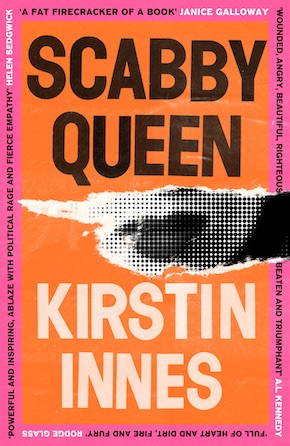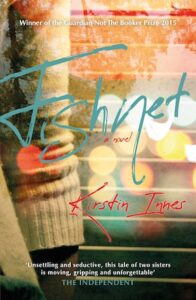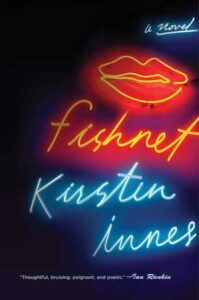Kirstin Innes: Infinite variety
by Farhana Gani
“Exquisite writing and an authentic central character you really care about. Gripping and moving. A literary triumph.” Nicola Sturgeon
Scabby Queen is a Scottish version of the Old Maid card game in which “the queen goes round and round, and the object is to get rid of her – pass her on to the next one as quickly as you can” – and the person left with the queen is hit over the knuckles with the full deck. Kirstin Innes’ latest novel (her debut Fishnet won the Not the Booker Prize in 2015 and a TV adaptation is now in development with STV) isn’t about cards or gambling, and the game itself only appears once and fleetingly, but Scabby Queen is an engrossing portrait of a charismatic and unruly woman set across five decades, from her birth to death. A few days before her 51st birthday, Cliodhna Jean Campbell, “curly hair, burning red” with a “husky, gorgeous laugh”, one-time pop celebrity and political activist, decides to end it all, and quietly kills herself in bed, in the home of a friend.
As she dies, the novel begins. It’s a story spanning the lives of friends, family and lovers in Clio’s life and through their reminiscences of this irrepressible woman, who at one time or another was a dominant force in their lives, a picture of Clio emerges alongside the story of a Britain in turmoil.
Scabby Queen is fiction spliced with real social history, and as a story of imagined lives based on historical facts it’s a deeply satisfying tale of a woman who emerges from a difficult childhood with passionate ideas about justice, social equality and her own place in the world. Slowly and deliciously Clio’s stormy life story emerges and it’s one full of messy behaviour, highs and lows, desire and disappointment, ill-treating and being ill-treated. It’s a story of a woman shaped and eventually destroyed by her world.
Modern British political history from the 1980s onwards – the poll tax riots, the Iraq War, anti-globalisation activism, the Scottish independence referendum, the divisions around Brexit – form the backbone around which Innes has woven a fictional tale of a captivating, talented and determined woman.
Innes’ narrative style is original and clever. It jumps from the past to present, with each chapter taking us back and forth in time, as we enter the minds of various people in Clio’s turbulent life. There’s her good friend Ruth, in whose house she chose to kill herself. Neil, a journalist who knew and loved her before she became a pop icon. Her neglectful parents Malcolm and Eileen. Her (unofficial) godfather Donald, who took her under his wing when she fled home. Her manager and ex-husband Danny. Hamza, her youthful lover. Sammi and Xanthe, her fellow Brixton squatters. Each one of them remembers a very different Clio, and each one in turn has led lives almost as stormy has hers.
Like the celebrated American novelist E.L. Doctorow, Innes meticulously weaves real events and social observation into the lives of her fictional characters. It’s a brilliant device in the hands of a confident, creative writer, and that undoubtedly is what Innes is – as a growing number of people in high places agree.
There’s something about the experience of reading a novel, where that voice is right up inside your head, making you see in ways you hadn’t previously considered, that encourages empathy.”
FG: Nicola Sturgeon read Scabby Queen, and took to Twitter to describe it as “a literary triumph” and your writing “exquisite”. How does a writer respond to praise like that from a world leader?
KI: Ha! Screaming and running around the house in a little circle, at first. Then very graciously. She actually slid into my DMs to tell me she loved the book; I had to spend some time workshopping how to respond with my friends. Decided to go with the fangirling at the end – if I was leading a country through a pandemic I think I’d like people to tell me if they thought I was doing a good job. (I’d also like to note that it’s a good thing I haven’t been leading a country through a pandemic.)
Are there any other heads of state you’d particularly like to have read your book?
Jacinda Arden because I have a bit of a crush on her and want her to be my friend (although we have toddlers the same age and what we’ve respectively accomplished in the same time period might make me anxious). Ach, I’d love to say that Johnson and Trump should read my book and learn about how other kinds of people think but I doubt either of them would ever pick up a book by a woman (or a book), and if they did I suspect anything that didn’t confirm their pre-decided narratives would go over their heads.
Val McDermid recently said that readers seem to make more empathetic leaders, which rings true to me. There’s something about the experience of reading a novel, where it’s just you and the narrative voice for pages and pages, and that voice is right up inside your head, making you see in ways you hadn’t previously considered, that encourages empathy.
Scabby Queen has been described as a state-of-the-nation novel, and it does delve into a certain era in modern British culture and politics. Was this always your ambition?
No. I started out with the idea of someone who had a lot of very intense, volatile and short-term friendships and relationships, and how their life story might look if told from the differing points of view of the people they loved and hated along the way. It was always the tiny little human interactions that propelled this book, not the big moments. The politics sort of slotted in later, as I was reacting to what felt to me like the blows of Brexit, Trump, that hardening that seemed to happen round about 2016. This book was how I dealt with them, how I processed what it meant to be politically active and feel exhausted by activism during a period of upheaval. It felt – it still does feel – as though this country (the UK) is walking back on almost all of the advances we’ve made in terms of equality and human rights over the past few decades; this all ended up pouring into the various stories this book tells.
It’s a portrait of a nation and a portrait of a defiant woman across five decades. Real politics is woven together with fictional lives and events and it reads like it could all be true. Tells us about the research you undertook.
Thank you, that means a lot, because I really tried to make it feel like it could be true. I read, basically. I read blogs and books and first person accounts of historical moments and time periods I wasn’t around for that it seemed to make sense that Clio would have lived through – the 90s squat in Brixton, the miners’ strikes and Poll Tax protests, the Genoa G8 riots, Britpop-era Camden. I looked for photographs and videos too, trying to see as much authentic detail as I could.
How did you shape Clio’s character? Did you base any aspects of her personality and appearance on real people?
No, she’s very much herself. I suppose the red hair and lipstick echoes Tori Amos a bit – the fictional Q magazine profile on her that opens the book was partly inspired by an interview I found with Tori Amos way back in the archives of the 90s. And her star-making Top of the Pops appearance where she refuses to mime to her song – there’s definitely something of Eddi Reader doing ‘Perfect’ in that; I remember watching Fairground Attraction on TOTP as a wee kid and being shocked that her mouth wasn’t moving and yet the singing was happening. That peek behind the curtain, the first intimation that non-compliance was possible (which is important to see, as a little girl). When Eddi Reader did it, she was laughing though – Clio tries to use her platform to get a political point across. She is very much her own woman; her personality evolved as I got to know the characters who would offer their opinions on her in my book, what they thought of her.
Clio’s story unfolds in a non-linear trajectory through the eyes of those who knew her best. Her friends, ex-husband, squat-mates, lovers and godfather are all strong characters and their own complicated lives are revealed. Writing a polyphonic narrative brings its own challenges. How many characters did you start off with?
Thank you for this one. Although Clio has grabbed most of the attention that Scabby Queen has got, for me the heart of the book is in the stories of the other characters, the ones whose points of view are available to the readers. There are loads of them (there were more – two didn’t make my editor’s cut, a further two didn’t make my final draft). I wanted to try and put together as complete a picture of Clio as possible without hearing from her, but it was just as important to me that the other characters felt real, whether it’s someone like Donald, her godfather, who knows her from birth to death and narrates a number a chapters, or Ida, an older woman who sits opposite her on a train for two crucial hours. The big challenge for me was that all of them needed to have convincing interior lives, feel real, be in the middle of their own stories.
There was no plan – even though I’d always intended that Clio’s story would be told from these differing, shifting viewpoints, I didn’t start out with the characters planned out. I wrote the book around IVF, getting pregnant, raising a baby into a toddler, and finished it two weeks before my second child was born, so the form really followed my available writing time (small bursts). Any sort of idea for a character I got (I usually start off stories with an idea of a person) immediately had to fold themselves into Clio’s world somehow. So it was far more haphazard than perhaps you’d expect. I’m still a bit confused as to how it all actually hangs together!
I wanted the book to be about those tiny shockwaves. The impact you can have someone without even realising it. Maybe it’s about the Butterfly Effect, with Clio as a sort of particularly loud, stompy, ginger butterfly.”
Clio is a force of nature, even though she’s no longer alive as the novel begins. Tell us what you particularly liked about her character (and her least attractive traits) and the qualities that draw people to her.
I’m not sure I liked Clio, necessarily, by the time I’d spent two years writing her from all these different angles, but that’s okay. I don’t need all my characters to be likeable, as long as they feel real to me. Clio is boundlessly charismatic and she’s driven by a sense of injustice, determined to make things right in the world as she sees them. She pulls people into her orbit, and they fall for her at first; they’re dazzled by her – but that sort of person, fascinating as they are, can be exhausting after a while. Clio needs to be the centre of attention; she’s entirely self-made, has built herself from nothing, and although she doesn’t realise it that resilience, that self-image takes dedication and constant reinforcement. I imagine she’s got a lot in common with Madonna, another sparkling, charismatic self-made woman who I suspect is unable to laugh at herself – but then what do I know about Madonna beyond the media around her I’ve consumed?
She’s a one-hit-wonder who wanted to change the world. Did she?
She certainly changed the worlds of each of the characters who narrate the book. I’m not sure there’s an overarching message to Scabby Queen, because I’m no longer sure whether or not one person could change the world in the sense that you mean, but I wanted the book to be as much about those tiny shockwaves that we all leave in each others’ lives as we go about our daily business. The impact you can have someone without even realising it. Maybe it’s about the Butterfly Effect, with Clio as a sort of particularly loud, stompy, ginger butterfly.
There’s a particularly poignant scene a few decades after her big hit when she addresses a political rally. Her attempt to rouse the young crowd is met with contempt. A sign of the changing times, which no longer holds Clio close to its heart?
That was the idea, but she’s adaptable, is my Clio. That particular scene happens, I think, in 2003 or 2004 – it’s a rally against George Bush and the Iraq War, and it also happens at a particularly low point for her personally, although I tried to reveal that slowly. Clio can reinvent herself though; by 2014, she’s campaigning for Scottish independence, building up a fanbase on Twitter.
Identity and belonging runs through the novel. Clio is Scottish, lives in London, and is very aware of her roots. She has a few chips on her shoulder and a lot of anger – feminist ideology doesn’t square up with her working-class reality; and she scoffs at animal rights campaigners, insisting that people come first. How is Clio’s view of the world shaped by her childhood and early success?
The phrase ‘chip on the shoulder’ is almost always used to describe working-class people who are angry about their circumstances. I wrote Clio as forged by the miners’ strikes; the poverty and strong Labour movements of Ayrshire in the 1970s–80s; she essentially comes of age during the Poll Tax protests in 1989–90 – that sort of righteous anger that she carries with her even as the wider activist movement changes. I thought it would be interesting to see how someone with that experience of grassroots activity would react to the comparative blandness of top-down movements like Make Poverty History. She is very much a product of the causes that made her, but I also wanted to explore the way her seemingly absent parents created a series of models for her to follow too.
She’s a political activist who looks out for others. She values friendship and solidarity; but she doesn’t hold back from sleeping with a friend’s boyfriend, harming their friendship. She champions principles but always on her own terms, right?
Yes, in some people’s view of her. There are other, contrasting views in there, though. I wanted to make it very difficult for a reader to say that Clio was entirely or definitely one thing, again because it mirrors the way that we understand people ourselves.
Is there a place for a pop star like Clio in the music business today?
Real talk: I am the last person who should opine on the music business today as for the last four-and-a-half years the music I’ve listened to regularly has been kids’ TV themes, Baby fecking Shark or songs sung by Disney ice queens. I did watch the Taylor Swift documentary on Netflix recently, and while any doc where the subject is also the producer is hardly going to be objective, I found it interesting that even someone as ostensibly powerful within the business as her was dissuaded from publicly expressing any sort of political opinion for FIFTEEN YEARS.
The thing about social media, I suppose, is that it reveals to us all too clearly that there isn’t just one mood of the nation (probably never was).”
Music in the 1990s was often militant, reflecting the mood of the nation, the anger, frustration, inequality. Today, not so much. What happened? Is it the internet? Social media?
I don’t know – to be honest my own experience of music in the 90s (as a teenager) was the farty ironic trombones of Britpop, everything shiny and apolitical, under a facade. Whereas maybe a lot of the music being made on a smaller scale – and usually disseminated through social media – now can be political in a way that big record labels wouldn’t let their artists be in the past (and still don’t, cf. Taylor Swift).
The thing about social media, I suppose, is that it reveals to us all too clearly that there isn’t just one mood of the nation (probably never was). So maybe there’s no place for a big epoch-defining song like I imagined Clio’s big (only) hit ‘Rise Up’ to be any more.
Who were among your own first songwriter–performer heroes, and how have your musical tastes evolved since?
Ooh, nice. First of all, I hate to say it, but I’m not a huge fan of a singer-songwriter! The music I return to tends to be rhythm section-heavy, and that usually needs to be a full band, rather than one bod with a guitar. I’ve always been drawn to magnetic, outspoken, convention-defying female performers – despite being fairly quiet myself, as a teenager I idolised Courtney Love and Shirley Manson from Garbage, and while Clio is definitely her own thing there are shades of the way SM was treated (sexualised) by the music press of the 90s in my book; Alison Goldfrapp was the great musical hero of my 20s and these days I’m a fully paid-up member of the church of Janelle Monáe.
Clio’s song ‘Rise Up’ is used at left-wing political rallies. Which songs would you suggest followers of Jeremy Corbyn, Keir Starmer or Nicola Sturgeon might adopt?
I imagined ‘Rise Up’ to be a combination of Patti Smith’s ‘People Have The Power’, ‘99 Red Balloons’ by Nena and Aztec Camera’s ‘Good Morning Britain’. I would definitely suggest that they all stay clear of ‘Things Can Only Get Better’ by D:Ream.
You’re a fan of Scotland’s first national poet Edwin Morgan. Does his poetry influence your work? Why should people across Britain be reading him?
I don’t know if there’s clear influence visible as I’m not much of a poet; I love Edwin Morgan because he stretched the possibilities of literary language as wide as the galaxy, and because he combined a playfulness and musicality of language with honest, human emotion.
The lockdown appears to have impacted on writers in different ways. I’ve heard from many that they couldn’t concentrate and weren’t able to write, let alone read. What has been your experience? Any books you’ve read during this time that you’d particularly recommend?
I haven’t been able to concentrate, particularly. It felt as though we were in the middle of a live-action experiment or something – the news was changing every few hours; every few minutes sometimes, everything we thought we knew changing and changing again. Like a lot of other people I’ve been fixed to my phone, continually scrolling for the next update and the next. It’s not healthy, and it doesn’t help any sort of productivity, but it felt like an essential way of understanding what was going on. I also have two very young children (both under 5, so still requiring everything done for them) and no family support locally, so it’s been a very full-on few months – 13 hours of non-stop childcare a day for 156 days, interspersed with horror-scrolling – basically the opposite of the way I would usually work. The exhaustion is still sitting in my joints. Most nights, once the children went to bed my partner and I would just lie on the sofa or the floor and stare at the ceiling for a couple of hours.
I’ve just tried to distil the experience into a short story (commissioned for a collection called Scotland After The Virus, which publishes in 2021); I had to get experimental with the way the text sat on the page to try and convey it.
Reading has been just as difficult. With the news constantly updating, I’ve found my concentration shattered. The short, sharp, experimental burst of Exquisite Cadavers by Meena Kandasamy has really suited my fragmented state of mind; I’m now very much enjoying Shuggie Bain by Douglas Stuart.
What would Clio have made of this government’s handling of the pandemic? And how would she have responded?
Oh, she would not have approved. Clio would have been all over the 2am 40-tweet anger thread, picking fights with anyone with a flag in their avatar; getting blocked by Matt Hancock’s SpAds for abuse. Either that or she might have gone down the 5G conspiracy, tinfoil hat route – I can imagine that being told to stay at home, inactive, might have unstuck some other level of defiance in her. It definitely wouldn’t have been a period of rest and relaxation for her, or anyone who had the misfortune to care for her over the past five months. It’s maybe for the best that she wasn’t around to see 2020.
 Kirstin Innes is an award-winning writer and journalist living in the west of Scotland. Her first novel Fishnet (Freight Books, now reissued by Black & White in the UK and Scout Press in the US and Canada) was the winner of the Guardian’s Not the Booker Prize in 2015. Scabby Queen is published by Fourth Estate in hardback and eBook.
Kirstin Innes is an award-winning writer and journalist living in the west of Scotland. Her first novel Fishnet (Freight Books, now reissued by Black & White in the UK and Scout Press in the US and Canada) was the winner of the Guardian’s Not the Booker Prize in 2015. Scabby Queen is published by Fourth Estate in hardback and eBook.
Read more
kirstininnes.com
@kirstininnes
kirstin.innes
Author portrait © Becky Duncan
Farhana Gani is a freelance writer and a founding editor of Bookanista.
@farhanagani11
@bookanista
wearebookanista



